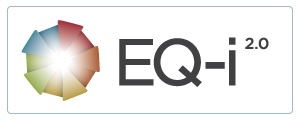Many of you that I have worked with me before know that my favorite Emotional Intelligence assessment is the EQ-i 2.0.
But first…. what is EQ? In short, Emotional Intelligence is understanding your own emotions and what you’re experiencing at that time. Being able to read the room (even if that room is only you and one other person) and being able to recognize what are the emotions they might be experiencing. Then using that information to navigate a situation in a healthy way.
Emotional Intelligence is defined by the ability to recognize, understand, and manage our own emotions, as well as recognize and understand the emotions of those we are in a relationship with or interacting with. It is also the ability to take this information and use it to navigate situations, relationships, conversations, or interactions in a successful way.
This skill is an important aspect of healthy relationships and leadership. People with strong emotional intelligence skills are able to read others, know themselves, and navigate with success.
How to Use Emotional Intelligence:
Emotional intelligence can be used in many different ways in your daily life. Some different ways to practice emotional intelligence include:
- Being able to accept criticism and responsibility
- Being able to move on after making a mistake
- Being able to say no when you need to
- Being able to share your feelings with others
- Being able to solve problems in ways that work for everyone
- Having empathy for other people
- Having great listening skills
- Knowing why you do the things you do
- Not being judgemental of others
- Having great interpersonal skills
- and the list goes on and on
Positive Impacts of Emotional Intelligence:
Developing your emotional intelligence takes a little work, but it will positively impact your work and personal life:
- Some research suggests emotional intelligence leads to better social relationships in children and adults.
- People often have positive perceptions of those with high emotional intelligence.
- Studies show that higher emotional intelligence is associated with improved job performance.
- Emotional intelligence can make you a better leader and collaborator.
- Strengthening your emotional intelligence can help you to form closer relationships with friends, family, and colleagues.
- Emotional Intelligence can help you set healthy boundaries at work and at home.
- Your motivation can also improve.
Understanding and managing emotions are integral to this, allowing individuals to build robust relationships, connect with others, and collaborate seamlessly in teams. Emotional Intelligence (EQ) goes beyond words, incorporating verbal and nonverbal cues such as tone and body language into communication. This skill enhances active listening, enabling individuals to respond thoughtfully to colleagues and clients. Moreover, empathy, a cornerstone of EQ, fosters deeper connections by acknowledging and sharing others’ feelings, creating a work environment based on trust and mutual respect.
Positive relationships in the workplace and at home are intertwined with emotional intelligence. By comprehending and managing emotions, individuals can navigate responses, avoid unnecessary reactions, and adapt to situations appropriately. This not only fosters a harmonious work environment but also contributes to increased productivity and career advancement.
In leadership roles, emotional intelligence becomes a critical factor. Leaders with high EQ inspire and motivate teams, tailor their approach to individual needs, and adeptly handle conflicts. By prioritizing emotional intelligence, leaders create a work culture that values empathy and collaboration, leading to better performance and successful outcomes for the entire team.
Want to know and measure your EQ (Emotional Intelligence)? Check these out:
More From Michele
When Setting New Year’s Resolutions: Remember your WHY
By now you have probably already made your New Year's resolutions. Most of us focus on what we want to start doing or what we want to stop doing. We may even do well by creating a schedule or new system in order to achieve this new goal. However, most of us omit...
Grit and Success
I had the honor of witnessing grit, courage, passion, and leadership this week at the NSBA Worlds Horse Show. At 22 years old, Holly acts as the trainer, groomer, and handler for her four horses. This is a job for more than one person in the equestrian world. ...
The Helper’s High: Health benefits of giving and volunteering
Giving to others - it’s not just good for the receiver. It’s also good for the giver. Giving can stimulate your brain's mesolimbic pathway, or reward center while releasing endorphins. This can lead to a “helper's high” that boosts self-esteem, elevates happiness, and...








